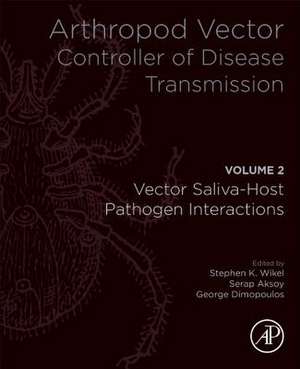Arthropod Vector: Controller of Disease Transmission, Volume 2: Vector Saliva-Host-Pathogen Interactions
Editat de Stephen K. Wikel, Serap Aksoy, George Dimopoulosen Limba Engleză Paperback – 27 apr 2017
The three themes of symbionts, vector immune defenses and arthropod saliva modulation of the host environment are central to the concept of determinants of vector competence that involves all aspects of vector-borne pathogen development within the arthropod that culminates in the successful transmission to the vertebrate host.
These three areas are characterized at the present time by rapid achievement of significant, incremental insights, which advances our understanding for a wide variety of arthropod vector species, and this work is the first to extensively integrate these themes.
- Provides overviews of host defenses encountered by the blood feeding arthropod vector at the cutaneous interface
- Addresses how these defenses are modulated by the vector, specific functions of vector saliva components, host response to vector-borne infectious agents and how vector-borne pathogens themselves modulate host defenses
- Features expertly curated topics to ensure appropriate scope of coverage and aid integration of concepts and content across chapters
Preț: 473.64 lei
Preț vechi: 608.44 lei
-22% Nou
Puncte Express: 710
Preț estimativ în valută:
90.63€ • 94.87$ • 75.43£
90.63€ • 94.87$ • 75.43£
Carte tipărită la comandă
Livrare economică 24 martie-07 aprilie
Preluare comenzi: 021 569.72.76
Specificații
ISBN-13: 9780128053607
ISBN-10: 0128053607
Pagini: 332
Dimensiuni: 191 x 235 x 22 mm
Greutate: 0.68 kg
Editura: ELSEVIER SCIENCE
ISBN-10: 0128053607
Pagini: 332
Dimensiuni: 191 x 235 x 22 mm
Greutate: 0.68 kg
Editura: ELSEVIER SCIENCE
Cuprins
1. Network of Cells and Mediators of Innate and Adaptive Cutaneous Immunity: Challenges for an Arthropod Vector
2. Vector Arthropods and Host Pain and Itch Responses
3. Arthropod Modulation of Wound Healing
4. Salivary Kratagonists: Scavengers of Host Physiological Effectors During Blood Feeding
5. Basic and Translational Research on Sand Fly Saliva: Pharmacology, Biomarkers, and Vaccines
6. Unique Features of Vector-Transmitted Leishmaniasis and Their Relevance to Disease Transmission and Control
7. Early Immunological Responses Upon Tsetse Fly–Mediated Trypanosome Inoculation
8. Mosquito Modulation of Arbovirus–Host Interactions
9. Tick Saliva: A Modulator of Host Defenses
10. Tick Saliva and Microbial Effector Molecules: Two Sides of the Same Coin
11. Tsetse Fly Saliva Proteins as Biomarkers of Vector Exposure
12. Epidemiological Applications of Assessing Mosquito Exposure in a Malaria-Endemic Area
13. Ixodes Tick Saliva: A Potent Controller at the Skin Interface of Early Borrelia burgdorferi Sensu Lato Transmission
14. Translation of Saliva Proteins Into Tools to Prevent Vector-Borne Disease Transmission
15. Considerations for the Translation of Vector Biology Research
2. Vector Arthropods and Host Pain and Itch Responses
3. Arthropod Modulation of Wound Healing
4. Salivary Kratagonists: Scavengers of Host Physiological Effectors During Blood Feeding
5. Basic and Translational Research on Sand Fly Saliva: Pharmacology, Biomarkers, and Vaccines
6. Unique Features of Vector-Transmitted Leishmaniasis and Their Relevance to Disease Transmission and Control
7. Early Immunological Responses Upon Tsetse Fly–Mediated Trypanosome Inoculation
8. Mosquito Modulation of Arbovirus–Host Interactions
9. Tick Saliva: A Modulator of Host Defenses
10. Tick Saliva and Microbial Effector Molecules: Two Sides of the Same Coin
11. Tsetse Fly Saliva Proteins as Biomarkers of Vector Exposure
12. Epidemiological Applications of Assessing Mosquito Exposure in a Malaria-Endemic Area
13. Ixodes Tick Saliva: A Potent Controller at the Skin Interface of Early Borrelia burgdorferi Sensu Lato Transmission
14. Translation of Saliva Proteins Into Tools to Prevent Vector-Borne Disease Transmission
15. Considerations for the Translation of Vector Biology Research
